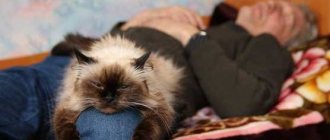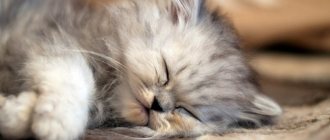Cat survival
An adult rarely weighs less than 40 kg. Assuming the average weight of an adult cat is 3 to 4 kg - excluding Maine Coons, Savannah cats and other larger breeds - this means that cats are choosing to sleep with a person who weighs at least 10 to 13 times more than them.
So if a cat is intelligent and keen to survive without being turned over in the middle of the night, it will naturally choose to sleep in a safer place: its feet. There is less weight, and the chances of escape are easier and greater.
In fact, cats develop the habit of moving towards either end of the body (head or legs) when they become adults, while in general kittens sleep on the chest of their preferred and sleeping owner.
Kittens love to sleep on their owner's chest as they can feel the heartbeat and in turn feel protected, which reminds them of their mother and lactation.
However, once cats learn that humans move and roll in their sleep, they learn and adapt. This explains one of the main reasons why your cat loves to sleep with you.
You are my alarm clock; I will follow your regimen
Have you ever noticed that when feeding time approaches, your cat goes to the kitchen and waits?
Our cats are the same! And they eat four times a day.
There is no way to skip a meal, because Calista begins to bite her leg, and Beau sits proudly in a chair, as if this is his rightful place.
Cats may be comfortable sleeping with you because it helps them establish a more structured schedule. Cats sleep most of the day and appreciate time when they can rest next to their owner.
And this brings us back to the first point - cats sleep more peacefully next to their owner. Cats begin to consider certain hours of the night/morning extremely safe for sound, restful sleep.
But be prepared for an unceremonious awakening if your cat wakes up before you and it’s time for breakfast.
Cats love routine
Did you know that cats love routine? When a cat sleeps at your feet, they realize that a habitual awakening is based, moves towards your face and begins to rub against you and meow. Cats like routine, without unpleasant surprises.
This means that if you usually wake up at 8am every morning, they recognize this action and try to comply with it. You may have noticed that if you are sick and in bed, your cat is more likely to stay with you and keep you company.
Emotional
Like any living creature, cats need not only physical comfort, but also emotional comfort. Having a pet, a person bears full responsibility for it - feeding, caring for, playing, caressing and pampering. It is not surprising that animals perceive their owner as a “mother” and subconsciously reach out to him for another portion of care and love.
It is the desire to feel calm, safe and protected that prompts cats to seek refuge in their feet, perceiving them as the most reliable refuge.
Cat instinct
Cats are territorial, attractive and sociable animals. Every square centimeter of their home is their territory. Thus, as kittens they are already dedicating themselves to patrolling and exploring every corner of their new household.
This instinct of a cat, like any other animal, is to understand their territory and habitat. Cats want to know about everything around them in order to feel safe.
Cats will be affectionate with all family members. They will play, beg for attention, and often make everyone in the family love them.
However, it is normal that there is one person they prefer more than others and will most likely decide to sleep with. If your cat likes to sleep on the legs of a particular person in your family: it's because that person is his favorite.
For what diseases does a cat lie down on its feet?
Even eminent scientists in the field of zoopsychology cannot determine exactly what diseases cause a cat to lie down. It is believed that mustachioed healers occupy this position in case of diseases of an inflammatory nature - arthritis, myositis. Pathological processes accompanied by inflammation are characterized by an increase in local temperature in the affected area (joints).
Cats very sensitively sense the slightest change in the environment and react even to a slight increase in temperature, choosing a warmer place to rest. And if the owner often notices that the cat goes to sleep on his feet, the health of the joints should be checked.
Felinotherapy
Some scientists believe that the human body is an analogue of an electric battery, in which the head is the positive pole, and the charge with a minus sign is located in the legs. Pets sensitive to electromagnetic fields prefer to sleep at the feet of a person, thereby, as it were, removing negative energy. This theory appealed to cat lovers who consider these animals to be natural healers.
The cat is sleeping at your feet: not what you think
Naturally, you may think that the only reason your cat sleeps at your feet is because they love you and want your company. This may be somewhat true, but not always.
In your cat's mind, you are often the one sleeping on your feet, not the other way around. Since you live in your territory and she recognizes you, she allows you to sleep on your side. Besides the fact that your cat likes to sleep on you or lie next to you: your cat will show you affection or trust by licking you.
Cats are very hygienic and thoroughly wash themselves and lick themselves with their own tongue. If you bring home a new cat, especially if it's another cat, your cat will likely be unhappy for a while.
She will be unhappy and may suffer from aggression, isolation and neglect. Some cats may even shy away from you a little. In this case, make sure that you give both kittens equal attention and communicate properly with both. Over time, your first cat will get to know the new cat and things should get better and get back to normal.
Sleeping on the table
It was believed that if a cat took a fancy to the table, it meant the death or illness of one of the household members, and if it liked to lie on the kitchen table, it meant it was trying to get the man out of the house.
This terrible omen also has a basis. Animals that led a semi-wild lifestyle in ancient times were carriers of many diseases, which ultimately led to sad consequences. And a man’s departure is inevitable if he constantly gets cat hair in his food.
From a scientific point of view, everything is more prosaic; in nature, cats are excellent at climbing trees and climbing up hills because... From there it is easiest to monitor what is happening around them, so the table is a good observation point for them and nothing more.
How many hours a day does a cat sleep?
If you're jealous of your cat for the number of hours he spends sleeping each day, don't worry, you're not the only one! Whether your cat sleeps in your head, on your chair, in the sun, on your computer, or in the strangest and most unlikely places, know that cats are comfortable everywhere!
Although it seems incredible, a cat's body needs everything in order to stay healthy. Are you wondering why cats sleep so much? If yes, don't miss reading this article where we will discuss how many hours does a cat sleep per day.
How many hours a day do kittens sleep?
If you have a litter of newborn kittens at home, you may notice that they spend most of their time sleeping. It's also normal that this can cause anxiety for any new kitten owner. However, as long as these kittens wake up to eat and be collected by their mother, there is no need to worry.
During the first days of a kitten's life until 4 or 5 weeks of age, kittens sleep about 90% of the day. This is approximately up to 20 hours of sleep per day. But is all this sleep time necessary for kittens? Yes! Because while kittens sleep, hormones are produced that stimulate their growth. This amount of sleep ensures that the kitten is fully developed within the agreed period of time.
Although kittens sleep a lot, they do not remain completely inactive. It is not uncommon to notice that when your kitten is in deep sleep, he will move his paws or that his body will tremble. These movements correspond to the exercise necessary for the proper development of the kitten.
By the fifth week, kittens dramatically reduce their sleep time to about 65% of their time. You will notice that the remaining 45% of this time will be spent playing and feeding.
Purr
Folk omens have not ignored cat songs. The purring of cats under different circumstances can mean:
- at the bedside of a sick person - to a speedy recovery,
- lay down or sat on a suitcase and purred - to a quick and easy road,
- during wedding troubles - to a successful and happy marriage,
- before fishing - for a good catch,
- on the lap of a person who has come to visit - to a good relationship with him, to friendship,
- in the arms of a pregnant woman - to an easy birth.
With its purring, a cat expresses pleasure, which means everything will be fine.
Not all domestic cats can boast of mystical abilities. Purebred cats lose these properties with each new generation. The most “talented” are those who came to the person themselves. If a small kitten meows at your doorstep, do not drive it away; maybe it was sent to you from above to protect you from troubles and illnesses. Take this little miracle for yourself so that comfort and kindness will settle in your home.
How many hours a day do adult cats sleep?
After the fifth week and until the cat's first year of life, as we said earlier, kittens sleep only 65% of the time. However, once a cat reaches adulthood, the average number of hours a cat sleeps increases again.
This sleep time for cats increases to approximately 70% and 75%, that is, 15 or 16 hours a day. Typically, it takes one year before the cat reaches adulthood. This time, however, depends on the cat's breed, as some breeds will take longer to reach adulthood.
Despite these long periods of rest, an adult cat does not sleep for 16 hours straight. These 16 hours of sleep are usually broken up by cat naps throughout the day. During this sleep, you will notice that your cat wakes up quite easily.
In fact, a cat falls into deep sleep once or twice a day. You've probably also noticed that cats can fall asleep anywhere!
How do representatives of the cat family roost in nature?
For a long time, zoologists focused only on monitoring hunting and social relationships in prides, but with the advent of GPS collars, a number of large-scale studies were conducted that made it possible to understand how representatives of the cat family choose their habitat. The best hunting areas are not necessarily the safest places to relax.
It is important for felines to have a den where they can sleep peacefully. This could be an improvised cradle in a tree, a hollow, a space between boulders, or a level step on a steep cliff.
Sometimes these predators occupy the homes of other animals, but do not neglect the main rule: the place to sleep should not be fenced, it is necessary to have a clear escape route. Wild cats that live near humans may nest in storm drains, abandoned cars, or buildings without doors, but they never sleep in the open.
Both solitary and collective predators carefully fence their personal territory. They sleep separately from their relatives, mark and guard their lair, and communicate with group members in a neutral zone.
How many hours does an old cat sleep?
A cat's old age is calculated slightly differently depending on the cat's breed. Although, as a general rule, when a cat is over twelve years old, most are considered senior cats. When they reach old age, it may be difficult to notice any changes since they do not change physically.
But gradually, you may notice a change in your old cat's behavior. Older cats become more sedentary and calm. Changes in appearance in cats only occur when they are around 15-18 years old or if your older cat is sick.
As cats age, their activity levels decrease, and older cats tend to sleep more hours. An older cat will sleep approximately 80% to 90% of his day, which is 18 and 20 hours. This is very similar to the number of hours a kitten sleeps.
Sleeping on his back
There is a sign: if a cat sleeps on its back, with its paws spread to the sides, wait for a thaw. If the pet is looking for a place to warm up, frost will strike. These furry barometers can predict weather changes and respond accordingly. Our observant ancestors noticed this long ago.
Modern science considers an animal sleeping in an unprotected position, with its belly open, as simply the highest sign of trust in its owner.
Why do cats sleep so much?
There is no consensus on the reason why cats sleep so much, although most studies are nurturing in this regard. These studies show that cats have the luxury, even in nature, of sleep. The reason for this is that they are good hunters and therefore do not need to spend as much time hunting as other animals.
In addition, in winter, cats prefer to rest longer to retain as much heat as possible. This also explains why cats seek out the warmest places to rest. And it is quite clear that this dormant custom, or instinct, was preserved by domestic cats.
Another reason why a cat sleeps so much is because they are bored or spend too much time alone during the day. If you are not home, it is normal for your cat to sleep. And when you get home, this lethargic manner may continue.
If your cat is lazy or sleepy, consider playing with her more, offering her toys and spending more time with your cat. But don't interrupt your cat's sleep time, as this can cause stress.
Many people believe that cats are exclusively nocturnal animals and therefore sleep during the day, but this is not true. Cats sleep at night too!
I don't want to be pinned down!
Have you ever slept with someone who tosses and turns in their sleep? Do you know what it’s like when someone leans on you with their whole body?
And if this is unpleasant for you, imagine what it will be like for the cat in this case.
Cats realize that they are much smaller than us, so they try to stay away from their centers of gravity (torso or stomach). So, if we start tossing and turning, there is a higher chance that they will wake up and run away.
Fussing in their sleep is the main reason why cats prefer to sleep near their owner's head.
What is a cat's sleep phase?
As mentioned, a cat's sleep phase is divided into a series of naps and deep sleep stages. Napping is usually a quick nap where the cat remains relaxed but at the same time alert to what is happening outside.
If a cat stays in this stage of sleep long enough to feel safe, it will eventually enter REM or deep sleep. When your cat is in deep sleep, you may notice that she shakes or moves while she sleeps.
This movement also tells us what cats dream about and what they can essentially dream about. When cats are daydreaming and in REM sleep, they may also perceive external stimuli (such as the smell of their food) and respond as if they were awake (moving their nose to pick up a scent).
In conclusion, it can be said that if a cat spends a long time sleeping, this is completely normal and necessary. The only time we would suggest that you would be a little concerned is if your cat sleeps more than these average hours.
Additionally, if your cat does not get up to eat, drink, play, or urinate during the sleep phase, caution should be exercised and a veterinarian should be consulted.
Sleeping together between a cat and its owner
For humans, spending time with a pet like this is not dangerous, so there should be no cause for concern when sleeping together. Cats love the smell of their owner and everything that he emits, so the animal does not miss a single opportunity to lie next to a person.
Negative aspects
You should not sleep with an animal on the same bed in the following cases:
- Restless sleep. When a person often tosses and turns, turns from one side to the other, you can inadvertently crush the paw or tail of an animal. In addition, cats sleep soundly and may not find their way in time. In this case, it is better to give your pet a separate sleeping area;
- Allergy to wool. Some people react particularly sharply to cat hair, they begin to sneeze, runny nose, and exhibit other allergic symptoms;
- Woman's pregnancy. It is recommended to wean your pet from the habit of sleeping on the same bed with its owner, since when the child is born, he will constantly be next to his mother;
- Birth of a baby. The proximity of a cat and a baby on the same bed is not recommended in order to avoid injuries from both the child and the pet. If a cat walks outside during the day and sleeps at home at night, it is worth limiting his access to the master’s and children’s beds, as he can bring home an infection or some parasites, infecting the baby.











